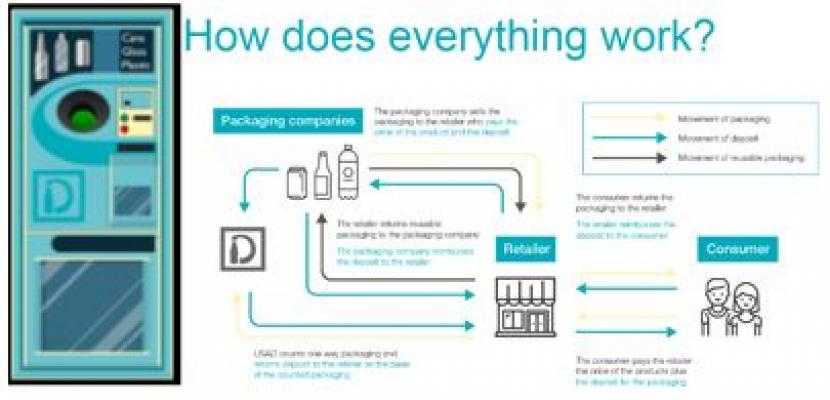
Lithuanian’s deposit system

About this good practice
The public institution Užstato Sistemos Administratorius (USAD) manages the entire deposit system, starting with collection of the packaging waste and ending with it being recycled. The main goal is a system that operates efficiently and is convenient for all stakeholders (producers and importer, retailers, consumers). Founding members
• Lithuanian Association of Breweries;
• Association of Lithuanian Trade Enterprises;
• Lithuanian Natural Mineral Water Manufacturers’ Association.
The founding members of Užstato Sistemos Administratorius release more than 80% of the packaging covered by the deposit system to the market.
Retailers apply deposit for one-way packaging when selling beverages. Consumers can redeem deposit when returning empty packages back to retailers.
The approved value for the packaging deposit is 0,10 euro.
The deposit is applicable to the following types of one-way packaging:
• Glass;
• Plastic (PET);
• Metal.
USAD collects over 600 million beverage packages through the reverse vending machines and at the manual collection points (operated by retailers). Collected containers are delivered to USAD counting center, where packages are counted, sorted and prepared for recycling. The deposit system reduces the demand for raw materials and electricity, and thus mitigates our impact on the environment on an annual basis. The Lithuanian deposit system alone is preventing 55,000 tones of carbon dioxide (CO2) from being released every year.
Expert opinion
Deposit return systems represent an effective method of beverage packaging collection. The system works with the principle of economic incentives, where a deposit is paid on purchase and is refunded with the return of empty packaging. Collection of different types of waste is high on the EU agenda. In the Single Use Plastic Directive (SUPD) the European Union even set a target of a 77% separate collection target for plastic bottles by 2025 – increasing to 90% by 2029. Countries that have implemented deposit return schemes achieve higher collection rates than kerbside programs, which is why more and more jurisdictions across the world make deposit return systems their chosen method of beverage container collection, hoping to achieve higher recycling rates and see a decrease in littering. The success of this good practice can be illustrated on the return rate of PET containers in Lithuania, with 34% prior to container deposit scheme, 74.3% at end of the first year and 91.9% at end of the second year. Lithuanian deposit system can serve as an inspiration to other countries across the EU, especially those who might struggle to meet the SUPD targets.
Resources needed
Deposit system infrastructure:
• Reverse vending machine (RVM) points – close to 1.000;
• Manual collection points – over 1.700;
• Counting and operations center – 1 location in country, counting center is located in Vilnius;
• 40-60 employees operate in counting center.
Evidence of success
USAD collects and transfers around 3500 tons of metal packaging for recycling every year. Metal recycling requires significantly less energy compared to mining. 95 percent less energy is used for the manufacturing of a can from used packaging. In nature, an aluminium can takes 50 to 200 years to decompose. Recycling of glass results in a 20 percent reduction of air pollution and a 50 percent reduction of water pollution, as compared to its production from primary raw materials.
Potential for learning or transfer
Obviously, the Deposit system as waste/packaging materials management tool is very attractive from different angles: society, environment, economy, resource efficiency, etc. Deposit system allows to achieve higher recycling targets comparing with other waste management systems.
Lithuania’s deposit system collects and recycle 92% of sold to market beverage packages (PET, metal, glass) every year. EU recycling targets by 2025 were already achieved and exceeded in 2017.
Positive opinion and high engagement of society (Consumer surveys conducted in 2018 & 2019):
• 97% of consumers answered that they are satisfied in general with functioning of the deposit system for single-use packaging.
• 95% of consumers indicated that the amount of garbage in parks, at lakes and other natural places, visited by people, decreased after introduction of the packaging deposit system.
• Since the start of its operation, Lithuania’s deposit system has prevented more than 240.000 t CO2emissions .
Further information
Website
Good practice owner
You can contact the good practice owner below for more detailed information.
“Užstato Sistemos Administratorius” (USAD)


